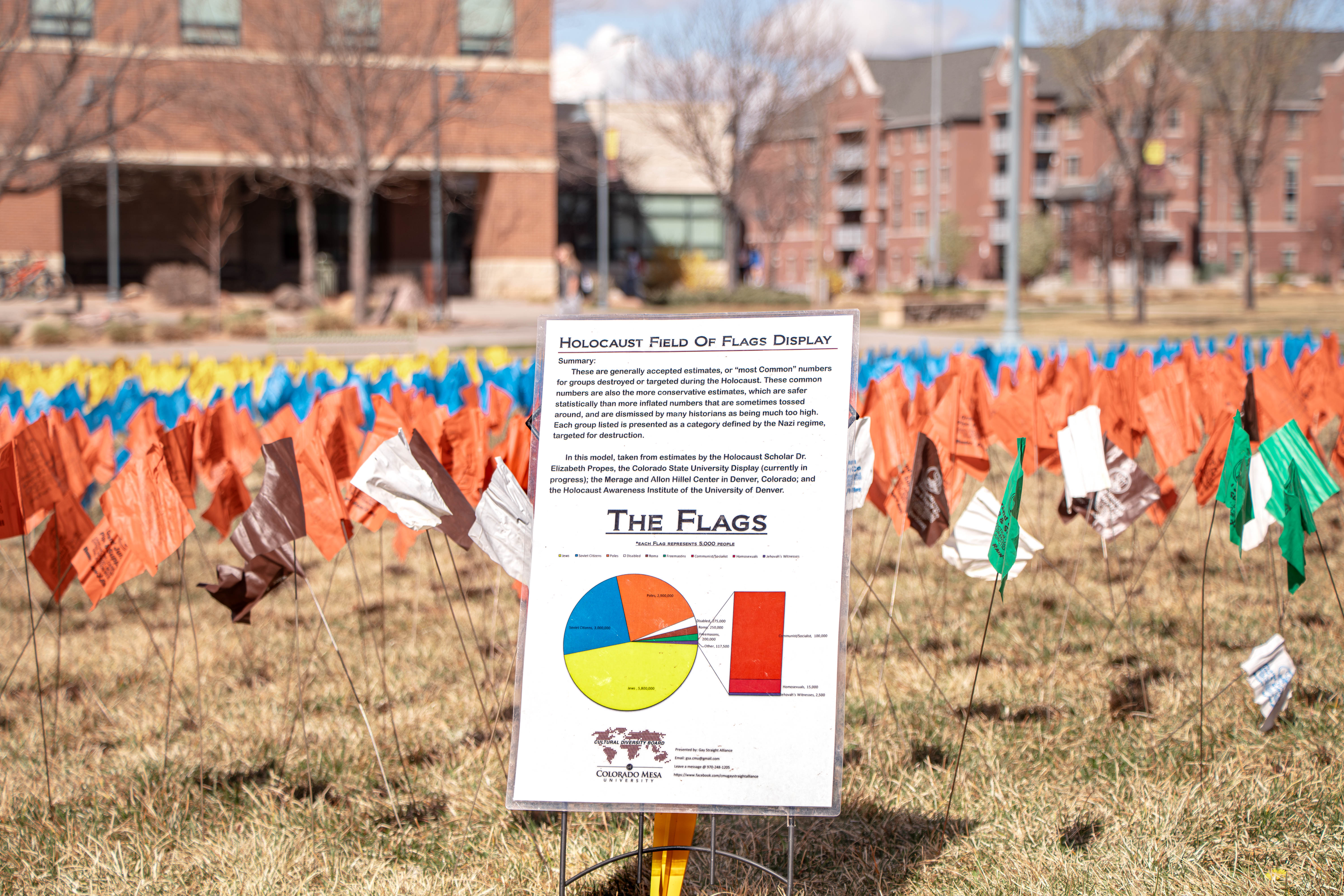In just over two weeks, Colorado Mesa University will transform its campus into a place of remembrance for the 22nd Annual Holocaust Awareness Series, running April 7-11. The interdisciplinary forum, a fixture since 2004, invites the western Colorado community to join students, faculty and staff in exploring the origins, experiences and implications of genocide—from the Holocaust to modern-day atrocities in places like Myanmar and Sudan. With over 2,000 flags set to blanket the field southwest of the University Center and a lineup of compelling speakers, including a 97-year-old Holocaust survivor via Zoom, this year’s series promises to educate, inspire and heal.
Associate Professor of History Vincent Patarino, PhD, who founded the series over two decades ago, sees it as more than an academic exercise.
“It’s about uniting our campus with the broader community through education, respect and reverence,” said Patarino.
A Visual Reminder: The Field of Flags
The series kicks off with a tradition that’s moving and visible: the Field of Flags. Volunteers from across campus and Grand Junction will plant over 2,000 flags southwest of the University Center, with all flags representing 5,000 lives each. Each flag color will represent different groups whose lives were lost to Nazi persecution during World War II.
On Sunday, April 6, at 1 pm, faculty, staff and students will gather to construct the field, with media welcome to capture the moment. The official dedication follows on Monday, April 7, at 10:50 am, featuring a moment of silence to reflect on the staggering toll of genocide. Signs crafted by CMU students will detail the display’s meaning, ensuring its message resonates. The display, sponsored by the Social and Behavioral Sciences Department and made possible by Grand Junction Pipe and Supply’s donation, will stand through April 12.
“It’s a visceral reminder,” Patarino said. “You walk by and see the scale of loss—it sticks with you.”
A Week of Insight and Inspiration
The series unfolds over five days, offering free events open to all. Here’s what’s in store:
- Monday, April 7, 6:30-8 pm, Houston Hall 204: Political Science Professor Tim Casey opens with “Hannah Arendt and the Origins of Totalitarianism: Lessons for Our Times.” Casey will unpack Arendt’s seminal work, exploring how a modern democracy like Germany embraced hate and what that might mean for today’s politics. Expect a lively discussion to follow.
- Tuesday, April 8, 6:30 pm, Asteria Theater: The keynote, “Life that Matters,” brings Holocaust survivor Ben Lesser into focus virtually. At 97, Lesser will join via Zoom to share his story of surviving four concentration camps, two death trains and a death march. Liberated from Dachau in 1945, he and his sister were the only family members to survive. Now, through his Zachor Holocaust Remembrance Foundation, he champions the “I-SHOUT OUT” initiative against intolerance. The night includes the first Colorado screening of a film about his life, comments from his daughter Gail Lesser Gerber and insights from filmmaker Ann Raskin. Kinesiology Professor Kristin Heumann organized the event, backed by the CMU Foundation, Civic Forum and donor David Pilkenton. A Q&A caps the evening.
- Wednesday, April 9, 4:30-6 pm, Houston Hall 204: English Assistant Professor Colin Carman presents “Conspiracy, Bystanding & The Banality of Evil,” weaving Arendt’s theories into the Kitty Genovese murder, Shirley Jackson’s “The Lottery” and the 2001 film Conspiracy about the Wannsee Conference. It’s a call to reject indifference.
- Wednesday, April 9, 6:30-8 pm, Houston Hall 204: Guest speaker Thomas Pegelow Kaplan, a history professor from CU Boulder, offers “The Holocaust - A Global History? Approaches, Prospects and Objections.” Kaplan, author of The Language of Nazi Genocide, argues for seeing the Holocaust beyond Europe, from North Africa to Southeast Asia. A micro-grant from CU Boulder and CMU’s Social and Behavioral Sciences Department makes this possible.
- Thursday, April 10, 4:30-6 pm, Houston Hall 204: Anthropology Instructor James Coburn shifts focus to “Korean Comfort Women: The Conflict that Raged Beyond World War II.” He’ll screen Silence Broken, a documentary on the 300,000-400,000 Korean women forced into prostitution by Japan’s Imperial Army, followed by a discussion on this lesser-known genocide.
- Thursday, April 10, 6:30-8 pm, Houston Hall 204: English Professor Barry Laga closes with “Aestheticizing the Holocaust: Art Spiegelman’s Graphic Novel, Maus.” Laga will explore how Maus balances history and fiction, revealing the constructed nature of the past—and its stakes.
A Legacy of Learning
Patarino launched the series in 2004 after encountering local anti-Semitism, determined to make CMU a beacon of discourse. Twenty-two years later, it’s a testament to that vision.
“Students tell me years later how it shaped them,” he said. “That’s the impact we’re after.”
This year’s lineup reflects both continuity and evolution. Arendt’s ideas thread through multiple talks, while Lesser’s testimony and Coburn’s Pacific focus broaden the lens. The dedication to CMU’s community hints at a response to recent challenges—perhaps a post-pandemic reset or a nod to campus unity.
“The series isn’t just about the past,” he said. “It’s about asking what we do now, here, to prevent ‘never again’ from becoming an empty phrase.”
Get Involved
All events are free, no RSVP required. For more details, contact Patarino at [email protected]. Whether you’re planting flags, joining a discussion, or hearing Lesser’s story, the Holocaust Awareness Series offers a chance to learn, reflect, and connect—right here at CMU.
